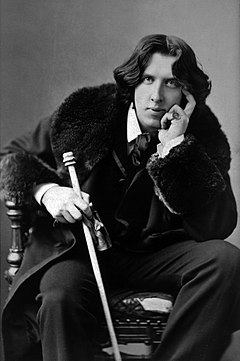baptised 26 February 1564
died 30 May 1593
English dramatist, poet and translator of the Elizabethan era. As the foremost Elizabethan tragedian,next to William Shakespeare, he is known for his blank verse, his overreaching protagonists and for the homoerotic situations and incidents which occur in his plays and poems more frequently and more variously that in any other major English Renaissance writer.
Two famous quotations attributed to him were "St John the Evangelist was bedfellow to Christ and leaned alwaies in his bosome, that he used him as the sinners of Sodoma" and "That all they that love not Tobacco & Boies were fooles". These may have been invented by his enemies, but they are in keeping with sentiments expressed or implies in his work.

Born two months before Shakespeare, Marlowe was the son of an established and respectable shoemaker in Canterbury, where he attended the King's School, later going on to take both his B.A. and M.A. degrees at Corpus Christi College, Cambridge. One month before he was to appear for his commencement in 1587, amid rumors of his conversion to Catholicism and flight to France, the university received a letter from the Queen's Privy Council excusing his absence and assuring them of his loyal service to Elizabeth. This letter has created a great deal of speculation about the dashing and iconoclastic young man's activities, suggesting that he was probably working as a government spy.
The final six years of his short life were spent in London where "Kit" Marlowe was usually involved in something scandalous or illegal, resulting in several scrapes with the law and at least one prison confinement. During these years, he produced his slender but highly important and influential canon: Dido Queen of Carthage (1586), Tamburlaine I and II (1597), The Jew of Malta (1589), The Massacre at Paris (1590), Edward II (1591), Doctor Faustus (1592), and the unfinished narrative poem Hero and Leander. The first genuine poet to write for the English theatre was killed, perhaps assassinated, under highly suspicious circumstances by a knife wound to the head in a private dining room in an inn in Deptford on May 30, 1593.
Twelve days before his death, Marlowe had been arrested on charges of atheism, stemming in part from his reputation and from accusations made against him by fellow playwright Thomas Kyd, who had been charged earlier; Kyd's claim was based on documents seized during a search of the rooms both men used for writing. This sort of sensation followed Marlowe throughout his life and, seemingly, was fostered by the poet himself.
After his death, claims about him became more personal and explicit. In the proceedings of his inquest, government informer Richard Baines claimed that Marlowe had said that "all they that love not Tobacco & Boies were fooles," and in 1598, Francis Meres wrote that he "was stabbed to death by a bawdy seruing man, a riuall of his in his lewde loue." However characteristic of what we do know of Marlowe's life, these posthumous comments do little to establish his homosexuality.
However, Marlowe's work does demonstrate an understanding and compassion for mythological and historical homosexuality. His Hero and Leander deals directly with Jupiter's passionate infatuation for Ganymede, a story which is also mentioned in Dido, and his masterwork, Edward II, based on fact, can be considered the first gay play in English.
An effeminate child, Edward was given as a companion the orphaned son of a Gascon knight at age 14 by his royal father, who hoped that the handsome and virile 16-year-old Piers Gaveston would exert a positive and masculine influence on his son. However, Edward fell passionately in love, and the king banished Gaveston in 1307. Marlowe's play begins shortly after this point with Edward (who had become king upon his father's death) immediately recalling his love to court, much to the anger of his barons, who demand Gaveston's permanent banishment. Edward, more the lover than the ruler, will accept nothing of this and even shares his throne with Gaveston, who is eventually seized and beheaded. Enraged in his grief, Edward involves himself in a bloody civil war, eventually taking another lover, young Spenser, who also is killed by the barons. Edward himself is seized, forced to abdicate, and, in 1327, is murdered by having a heated poker inserted into his anus, "intended as just retribution for his sins." In this one play, Marlowe surpasses the achievements of many explicitly gay writers in his sensitive and complex portrayal of a doomed and passionate relationship between two men caught up in a repressive and homophobic society.
















